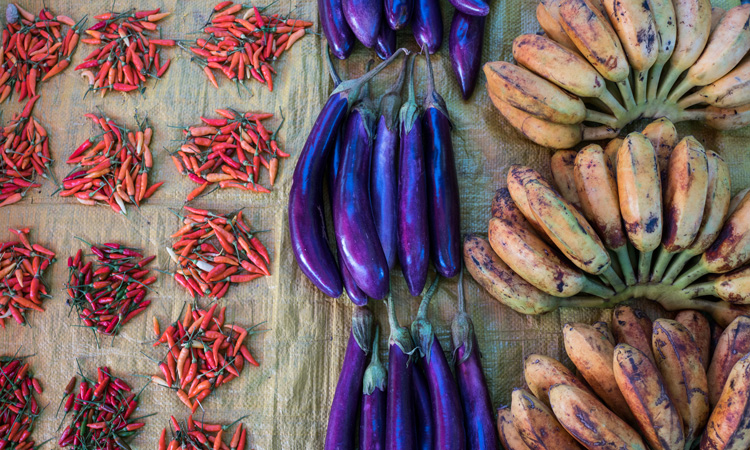Researchers urge communities to bolster local food production
- Like
- Digg
- Del
- Tumblr
- VKontakte
- Buffer
- Love This
- Odnoklassniki
- Meneame
- Blogger
- Amazon
- Yahoo Mail
- Gmail
- AOL
- Newsvine
- HackerNews
- Evernote
- MySpace
- Mail.ru
- Viadeo
- Line
- Comments
- Yummly
- SMS
- Viber
- Telegram
- Subscribe
- Skype
- Facebook Messenger
- Kakao
- LiveJournal
- Yammer
- Edgar
- Fintel
- Mix
- Instapaper
- Copy Link
Posted: 6 August 2020 | Sam Mehmet (New Food) | No comments yet
After examining food supply chain resiliency and import dependency in remote communities during the COVID-19 pandemic, researchers have called for change.


Local chillies, aubergines and bananas laid out on a bench to sell in a Pacific Island market - shot in Honiara, Solomon Islands
UC Santa Barbara marine conservationist Jacob Eurich and collaborators set out to analyse how the COVID-19 pandemic impacted smaller countries highly reliant on food imports and income from abroad – specifically in the Pacific Island Countries and Territories (PICTs), the island nations in the middle of the Pacific Ocean, from New Zealand to French Polynesia, and including the Marshall Islands to Papua New Guinea. While infection with SARS-CoV-2 has been slow relative to other parts of the world, the global lockdown is said to have outsized effects on their food systems.
“One of the key messages from the research is to rely less on global food supply chains,” said Eurich. While this study was specific to the PICT region, Eurich suggested that areas with few domestic alternatives to global supply chains are also vulnerable to similar threats to food security.
With their remote locations, lack of arable land and economies dependent on tourism imports, the PICTs have become reliant on movement in and out of the region for much of the food they consume and also for the money to purchase it, he noted.
But even with commerce slowing down, these countries and territories need not suffer food scarcity and malnutrition, the researchers said. “Coral reefs should operate as biodiverse, living refrigerators for coastal communities, sourcing replenishable, nutritious food,” Eurich said. “Coastal communities can and should be able to depend on traditionally-sourced diets if the resource is healthy.”
The time is ripe to reconsider the role of local production in the region’s food systems, the researchers said. For example. They highlighted that some areas with farmland could benefit by reinvigorating their production of root crops, fruits and vegetables which would not only decrease reliance on the global supply chain, but also provide healthy alternatives to imported processed foods.
“Bolstering local production and intraregional trade strengthens the food system,” he said. “Consuming more locally produced fresh foods and less non-perishable shelf-stable foods is a step in the right direction.”
Significant local processing and storage challenges must be overcome, according to the paper, and intra-island transport and food distribution strengthened. Particularly in the PICT region, where large scale local fish storage is currently inadequate, it helps to prioritise production of less perishable foods (like root crops) over fish, Eurich said.
“Climate change and natural disasters can be considered shocks to the system,” Eurich said. “The pandemic, while there was time to prepare, was still a shock. We have learned that enhancing storage, production and distribution through coordination and increasing regional transparency are keys of a resilient supply chain when these unexpected changes occur.”
Related topics
COVID-19, Food Security, Research & development, Supply chain








